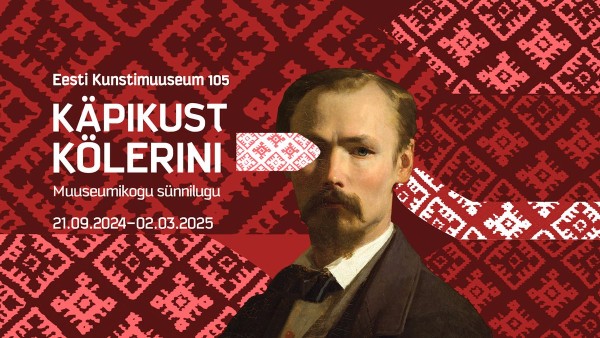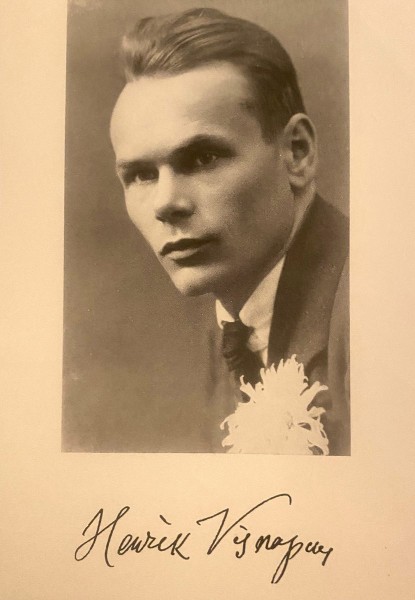Tõnu Naelapea
Translation is an art, requiring more than just linguistic breadth, a large vocabulary but also a feeling for the original. Especially in the case of literary translation. English is my second language and for over 30 years I have done my best to translate either from Estonian to English or English to Estonian as a sideline. Curiously, the first is easier. Perhaps due to the fact that I have an English university education and Estonian was learned at mother’s knee.
Hence I have great respect for those who are able to translate fiction from a secondary, or even tertiary, more, tongue. One such fine example is Eric Dickens (1953-2017) who has been called the foremost translator of Estonian literature into English. (Andres Gutman conducted a detailed interview with him that merits reading. It appeared in Estonian Life under the title “Eric Dickens – Estonia’s literary translator” in 2012 and is available on-line.)
By pure happenstance I chanced upon Dickens’ translation of Jaan Kross’ Vastutuulelaev in the public library. It was published in 1987 and I had read it in Estonian some 30 years ago. His translation of the book appeared in 2012 as Sailing Against the Wind.
Kross, considered as a Nobel Prize for Literature candidate towards the end of his life was prolific, focusing on Estonians who had left their mark on history. Vastutuulelaev straddles the line between true history and historical fiction. Estonians term many of his works as biographical novels, for the author when depicting conversations needs to revert to fiction. However all the historical facts remain true. Very well researched, it is the story of opticist Bernhard Schmidt, born on Naissaar toward the end of the 19th century. From a young age he was interested in astronomy and optics, ending up spending the bulk of his working career in Germany. The title of the book refers to a non-astronomy invention, Schmidt figured out a way to sail against the wind, building a boat that could sail without having to tack, regardless of the direction from which the air movement came.
Advertisement / Reklaam
Advertisement / Reklaam
Due to a teenaged fireworks mishap Schmidt lost his right hand. It is thus almost unbelievable that he made his name as a lens and mirror polisher, this with but one hand advancing greatly the astronomical telescope. Indeed his perhaps most famous lens, known as the Big Schmidt is still in use at the world-renowned Mount Palomar Observatory in California. In 1931 he invented what is now known as the Schmidt corrector plate, which is an aspheric lens that corrects the spherical aberration, introduced by the spherical primary mirror of the Schmidt or Schmidt-Cassegrain telescope designs. Schmidt worked in Germany during an especially tense time in history, the inter-war period. He had concerns about working in a country that was rearming. His conscience troubled him, as he knew of the potential military applications of telescopes. Kross in the original applies important social commentary, not only about the rise of fascism but with regard to the hyperinflation of the time, triggered by punitive post WW I financial demands as well as the Great Depression.
Dickens’ translation is quite frankly exquisite for a man who chanced upon Estonian purely by accident. Educated in the UK Eric Dickens first concentrated on Swedish, even moving to Uppsala to live and work. While in Finland he noticed Estonian literature in a bookstore and was fascinated by the language. Self-taught, he spent a year in Estonia, making the acquaintance of Kross and many other prominent literary figures. Dickens’ focus was on prose, but he has some poetry translations to his credit. The list of authors that he has translated is formidable – many Kross works, also Mati Unt, Friedebert Tuglas and Toomas Vint among others captured his attention.
With Sailing he truly conveys the elegant writing of Kross. Most notably the meditation on national identity that was Schmidt’s constant companion, torn between his roots, his beloved Naissaar and the practical reality of needing to work abroad. The translation was for this reader almost like a new work. While recognizing the faithfulness to the original I resisted the temptation to make a comparison between the Estonian and the English, not wishing to lessen the pleasure of rereading a wonderful book in a different language.
Advertisement / Reklaam
Advertisement / Reklaam
Estonians have always appreciated translators. I read many of the world’s classics from Tolstoy to Verne and Hašek, Cooper in Estonian as a youth. Since 1957 the Loomingu Raamatukogu has published books that provided access to great works in other languages.Dickens was a remarkable translator. Born to an English father and Dutch mother he grew up speaking both languages. He translated from Dutch, Swedish and Finnish beyond his notable Estonian oeuvre, which was his primary translation language. He also had reading knowledge of other languages, notably Polish, noting that it was, for him, more difficult than Russian. However, Finnish remained the hardest to learn as an adult, even more so than Estonian.
Translators serve an important role in disseminating, introducing a culture, inducing people to read and learn about, as Dickens discovered in Helsinki, languages that otherwise they might never consider as highly literary. The unfortunate early passing of Eric Dickens means that others will have to step up, fill the void. For the nonce we have in the Toronto public library system a number of Dickens’ translations for those more comfortable reading in English rather than the Estonian original. Sailing is recommended, sure to educate and entertain as great literature, great translation should and does here.
























